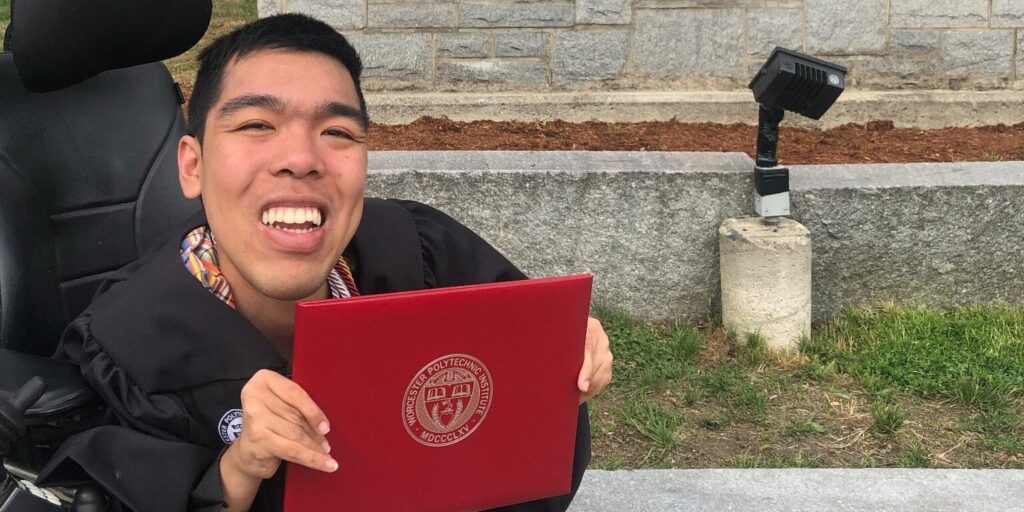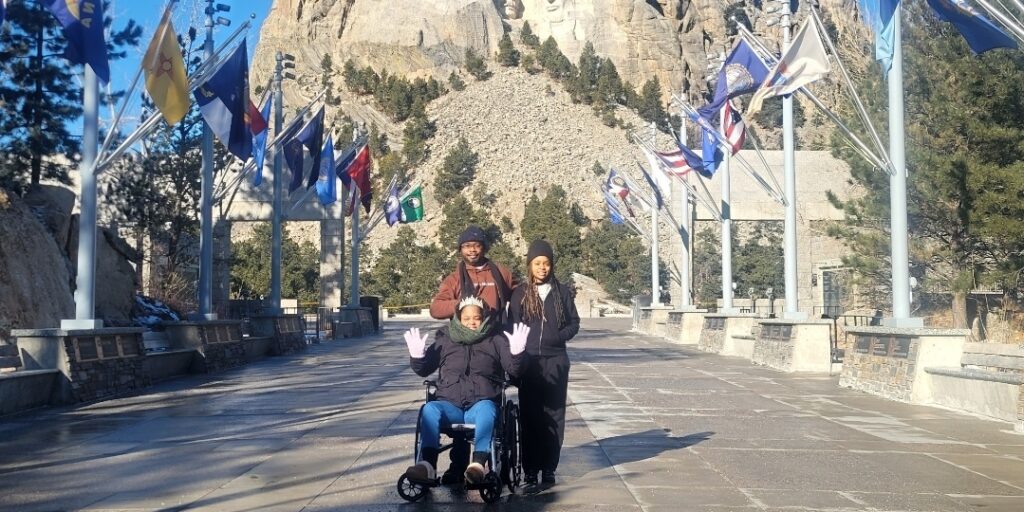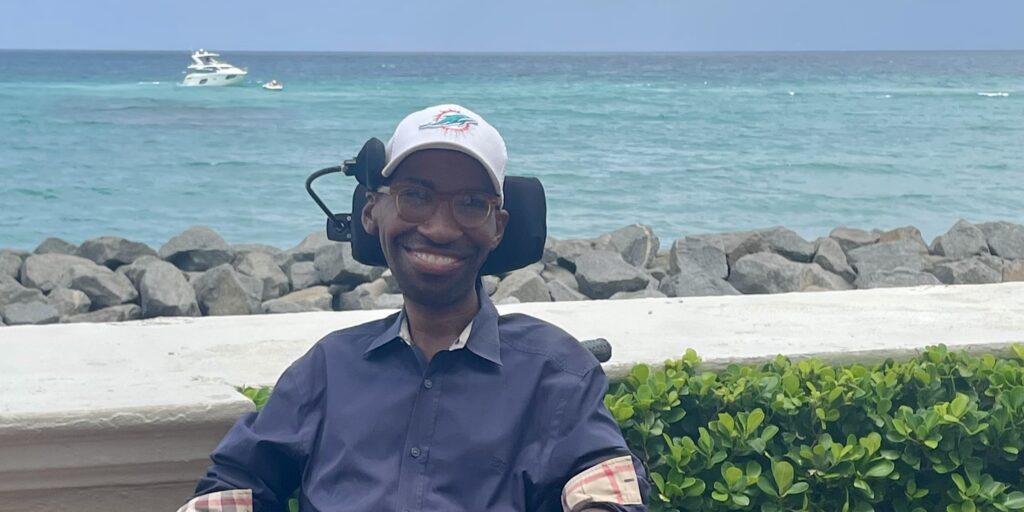
Back-to-(Grad)-School
By Justin Moy | Tuesday, August 16, 2022
5 Second Summary
Read more personal stories from members of the neuromuscular community about their College Experience as they share their journey, accomplishments, advice for accommodations and overcoming barriers, and insights into navigating college life with a disability.
Is it back to school already? It feels like almost yesterday that I graduated from Worcester Polytechnic Institute (WPI), but even so, I’ll soon be attending Boston University (BU) in the fall to pursue a PhD in bioinformatics. As I move forward in my education, there are definitely a few lessons I’m keeping from my undergrad.
Lessons Learned
I went to Worcester Polytechnic Institute (WPI) for my bachelors and masters degree in bioinformatics and computational biology. During my time there, I think the most important thing I learned was time management. WPI operated on seven week terms instead of semesters, so on top of fast paced classes, I also juggled extracurriculars, hanging out with friends, and of course, the added time to orchestrate living with a disability (Congenital Muscular Dystrophy (CMD)).
For the first two years at WPI before my brother came to WPI, I had to hire and manage external personal care attendants (PCA’s). During those years, I really honed my time management skills which, in turn, allowed me to maximize the number of activities I could participate in. I really enjoyed my time in Glee Club which is the tenor bass choir at WPI. We had the opportunity to do a lot of travel around Massachusetts which, on my end, required good communication.
On top of time management, I think the next most important thing I learned is clear communication – which goes hand in hand with time management. Understanding when I needed to communicate was just as important as the communication itself. As a baseline, I think clear communication and effective time management allowed me to manage my disability to the point that I could reach out and have a fun experience with friends at WPI.
Once I had the basics down, the next important thing was creating a supportive friend group. I remember I was at first hesitant to try and “hang out” with people because of the spontaneity, but over time I realized that spontaneity was key to creating memorable and lasting friendships. Most of the friends I made were from group projects spilling into social time.
Making it all work and taking responsibility
This social spontaneity is a big part of my reason for moving into Boston for my first year, but to make the move, I definitely needed to ensure my needs were met. I reached out to both the bioinformatics program director and the accessibility office to disclose my disability. I think it’s really important to stress that in higher education, it is the student’s responsibility to reach out for help rather than the school’s responsibility. By going through the disclosure process, I was able to secure accessible housing a block away from my classes.
In addition, from my time as an undergrad, I’ve learned to follow up my emails if I don’t get a response in the first few days. Compared to WPI, BU is a much larger school, so if someone hasn’t replied to my email, it probably just got buried in their inbox, and it doesn’t mean the recipient doesn’t care. Aside from email, I’ve found it never hurts to go to the relevant office in person. When I was trying to get swipe activation for the handicap door on my apartment, I was able to resolve the issue within an hour by just showing up to the housing office in person.
In some ways going to grad school feels a lot smaller than going back to undergrad. The bioinformatics program at BU only has about a dozen people in my cohort, so it definitely has a much more personal feel. Additionally there is a lot more independence compared to going to undergrad which is a bit disorienting. Nevertheless, this time around, I have a better idea of what I need to do, so the independence is manageable.
I’m only at the beginning of my PhD now, but at the same time it feels like the end, since it is the last landmark of my formal education before going into the real world of research. But again, it is just one step in my goal to cure my disease.
Curing my disease
The big question for me is what does a cure look like, and how can we measure the efficacy of prospective cures. Right now there are several promising avenues of development in both academia and industry. Specifically, strategies revolving around gene therapy, as well as protein replacement. Not only do we need people developing cures, but we also need natural histories and disease progression to understand and measure the effects of prospective cures. For me I see all of these as curing my disease. As much as I would love there to be a magic pill, I think a cure will be different depending on age of delivery and specific genetic mutations.
As much as I would like to cure my disease, science is also about teamwork, and having scientists studying their own disease brings a better viewpoint to research focus and goals. To that end, I have two pieces of advice:
My advice to students living with neuromuscular disease who want to go into research is to find people who want to help you. Research is so broad that it can be confusing to start, but I think finding a good mentor is more important than finding a lab in the specific area you want to be in. During my undergraduate time, I actually volunteered in a tuberculosis lab even though I wanted to do neuromuscular research. The professor in charge of the lab was a great mentor, and provided me with the skills to approach any research and ask questions that would point me in the right direction.
To the nervous parents reading this, I would say that it’s okay to be worried, but at the same time understand that there are support systems in place to help those with disabilities. Going to college is a big step, but the education and social connections will help your child thrive. Just because your child goes away to college doesn’t mean you are no longer involved in their lives. Your involvement just changes in scope.
TAGS: Ambassadors, College, College Experience, Education, Personal Care Attendants, Staying Active, Young Adults
TYPE: Blog Post
Disclaimer: No content on this site should ever be used as a substitute for direct medical advice from your doctor or other qualified clinician.




